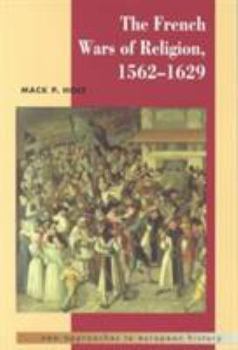The French Wars of Religion, 1562-1629
(Book #8 in the New Approaches to European History Series)
Select Format
Select Condition 
Book Overview
This book is a 2005 edition of Mack P. Holt's classic study of the French religious wars of the sixteenth and seventeenth centuries. Drawing on the scholarship of social and cultural historians of the... This description may be from another edition of this product.
Format:Paperback
Language:English
ISBN:0521358736
ISBN13:9780521358736
Release Date:October 1995
Publisher:Cambridge University Press
Length:253 Pages
Weight:0.84 lbs.
Dimensions:0.6" x 6.0" x 9.0"
Customer Reviews
1 rating
What is religious history?
Published by Thriftbooks.com User , 17 years ago
This book is a wonderful read. Offered as a survey book for undergraduates on the French Wars of Religion, the author succeeds in laying out the main points of an incredibly complex series of events. He downplays the theological issues and sees the "religious issues" as social history, i.e., as a struggle ultimately over the principle of "one king, one faith, one law" that had dominated the French consciousness as its unifying principle. According to Prof. Holt, the Huguenots challenged that principle, and the religious disputes played out in the context of that challenge. By writing the religious differences as social history, the result is automatically pro-Catholic though cast in seemingly more objective historical/scholarly language. Prof. Holt accepts that principle "one king, one faith, one law" as the norm, and thus depicts Huguenot leadership as well as Catholic leadership as having to deal with it. Should it be maintained by severe repression of the Huguenots? Would it be possible to have a Huguenot on the throne and still have that principle (seemingly it would not since the crown was sworn to stamp out heresy)? Could any kind of short or long term acceptance of the Huguenots be acceptable in light of the need to maintain fundamental unity? These are just some of the many questions Prof. Holt addresses. However, this is a book without heroes. Everyone has a mixed bag of good and bad qualities trying to work out compromises in the context of the overarching principle of state and other political and economic realities. Religion is a defining reality only up to a point. Basically other realities are defining for the actors on the historical stage. Henry IV is not judged to be a manipulator or a hypocrite for abjuring his religion but as a kind of pragmatist making decisions that were generally wise, albeit expressing a lenience towards the Huguenots in two brevets that were part of the Edict of Nantes. Catholic leadership would certainly find these brevets irksome and could not by any stretch of the imagination be thought likely to allow them to continue beyond Henry IV's death. Thus, it was almost inevitable that the support of Huguenot pastors by funds from the central treasury and the permission to allow the Huguenots to have fortified towns and their own militia (allowed for in the two brevets) were overturned by Louis XIII. Thus, the movement of events is looked at as carried out by pragmatic actors working out their destiny and the destiny of France within a narrow context. My main complaints are that Prof. Holt does not pay sufficient respect to the victims of the persecution. To me the Huguenots were martyrs to true religion. To me, the principle of "one faith, one king, one law" was a self-serving truth perpuating an invalid monarchy, an invalid religion, and a law that had no real depth and certainly lacked the important "rights" that came to be embodied in English law and in post-revolutionary French law. Protestant fa






